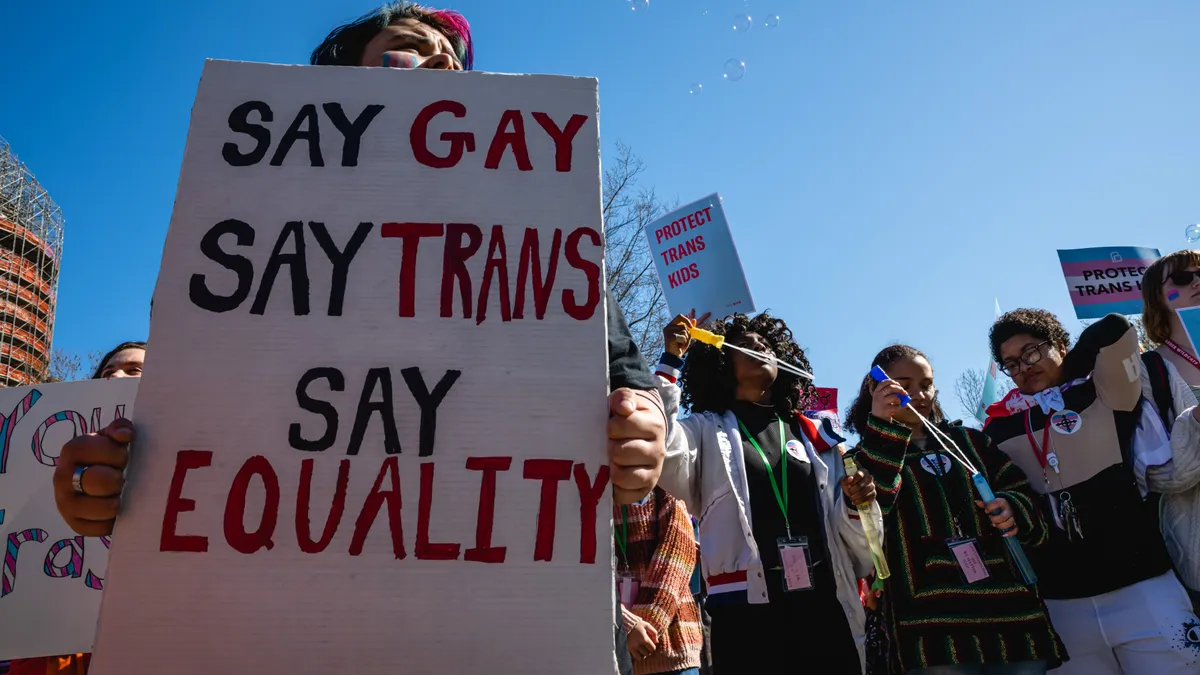Dive Brief:
-
A settlement announced Monday between Florida parents, students, teachers and state education leaders limits the scope of the state's Parental Rights in Education law — also known as the "Don't Say Gay" law —that civil rights advocates said was chilling classroom speech and infringing on the rights of LGBTQ+ students.
-
The settlement clarifies that references to LGBTQ+ issues are acceptable in literature, classroom discussion, academic work and in teachers' speech in some situations. It also prohibits instruction claiming that heterosexuality is superior to other sexualities or identities.
-
Other areas where LGBTQ+ issues are protected include when they are the subject of bullying prevention, extracurriculars, library books and guest lecturers.
Dive Insight:
Florida's anti-LGTBQ+ curriculum law was signed by Gov. Ron DeSantis in March 2022 and implemented by the state board of education that October. It was on the forefront of the curriculum censorship movement that has since spread to many other conservative states. Its language served as a blueprint for other states’ lawmakers in drafting their own versions of the measure.
It also led to worries from LGBTQ+ students and teachers that they would be found in violation of the law if they expressed themselves on issues related to gender and sexuality.
The settlement was reached with the Florida State Board of Education, Florida Department of Education, and certain school districts, and its terms were shared by LGBTQ+ civil rights organization Equality Florida, which filed the lawsuit. It addresses many of the worries shared by educators and clarifies that students and teachers can speak and write freely about gender identity and sexual orientation. References to LGTBQ+ people, relationships or families are not prohibited in any educational or extracurricular, either.
Gay-Straight Alliances, a student-run organization and a source of support for many LGBTQ+ students, are also protected.
"Simply put, the State of Florida has now made it clear that LGBTQ+ kids, parents, and teachers in Florida can, in fact, say that they are gay," said Roberta Kaplan, lead counsel for the plaintiffs and an attorney for Kaplan Hecker & Fink, in a statement.
Lawyers from that firm and from the National Center for Lesbian Rights filed the lawsuit one day after Gov. Ron DeSantis signed the "Don't Say Gay" bill on March 28, 2022. Supporters of the measure said the material it prohibited was not age-appropriate and infringed on the rights of parents to raise their children according to their personal beliefs.
The agreement that comes nearly two years later promotes "a much-needed culture of empathy and acceptance," said Shannon Minter, legal director for NCLR, in a statement on Monday.
It also comes one week after the 11th Circuit Court of Appeals paused another Florida policy impacting LGBTQ+ student inclusion. On March 4, a three-judge panel continued a block on the Stop WOKE Act, which prohibits employers, including schools, from conducting certain diversity, equity and inclusion trainings. That law was implemented in July 2022.
Judge Britt Grant, who wrote the unanimous opinion, said the law "penalizes certain viewpoints — the greatest First Amendment sin."
"The only way to discern which mandatory trainings are prohibited is to find out whether the speaker disagrees with Florida," Grant wrote. "That is a classic — and disallowed — regulation of speech."
DeSantis, who championed both laws now facing hurdles in court, said in a statement Monday that the "Don't Say Gay" deal made this week was a "major win." He pointed to other areas of the law that remain in effect, such as prohibiting classroom instruction about sexual orientation or gender identity for K-3 students.
“We fought hard to ensure this law couldn’t be maligned in court, as it was in the public arena by the media and large corporate actors,” said the governor's general counsel, Ryan Newman, in the statement. “We are victorious, and Florida’s classrooms will remain a safe place under the Parental Rights in Education Act.”







 Dive Awards
Dive Awards





